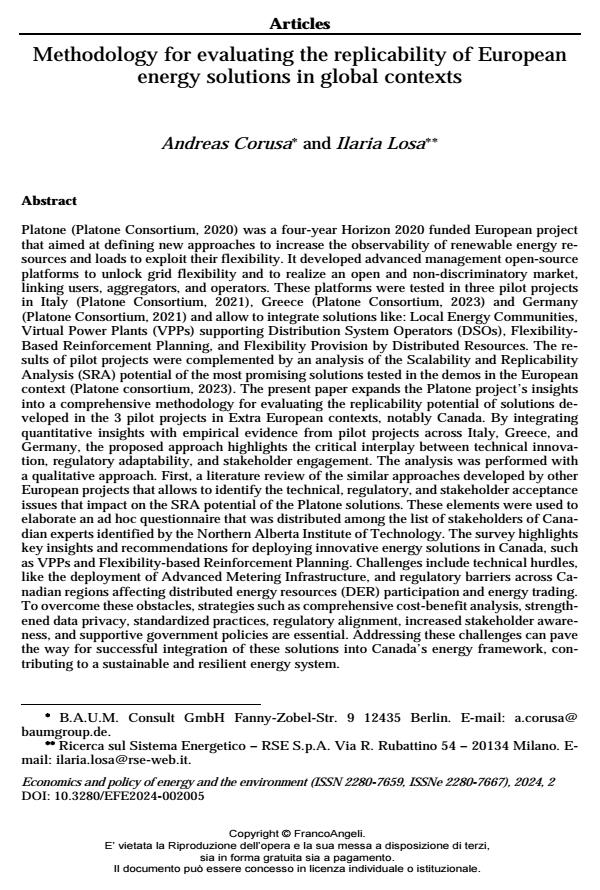Methodology for evaluating the replicability of European energy solutions in global contexts
Titolo Rivista ECONOMICS AND POLICY OF ENERGY AND THE ENVIRONMENT
Autori/Curatori Ilaria Losa, Andreas Corusa
Anno di pubblicazione 2024 Fascicolo 2024/2
Lingua Inglese Numero pagine 21 P. 87-107 Dimensione file 288 KB
DOI 10.3280/EFE2024-002005
Il DOI è il codice a barre della proprietà intellettuale: per saperne di più
clicca qui
Qui sotto puoi vedere in anteprima la prima pagina di questo articolo.
Se questo articolo ti interessa, lo puoi acquistare (e scaricare in formato pdf) seguendo le facili indicazioni per acquistare il download credit. Acquista Download Credits per scaricare questo Articolo in formato PDF

FrancoAngeli è membro della Publishers International Linking Association, Inc (PILA), associazione indipendente e non profit per facilitare (attraverso i servizi tecnologici implementati da CrossRef.org) l’accesso degli studiosi ai contenuti digitali nelle pubblicazioni professionali e scientifiche.
Platone (Platone Consortium, 2020) was a four-year Horizon 2020 funded European project that aimed at defining new approaches to increase the observability of renewable energy resources and loads to exploit their flexibility. It developed advanced management open-source platforms to unlock grid flexibility and to realize an open and non-discriminatory market, linking users, aggregators, and operators. These platforms were tested in three pilot projects in Italy (Platone Consortium, 2021), Greece (Platone Consortium, 2023) and Germany (Platone Consortium, 2021) and allow to integrate solutions like: Local Energy Communities, Virtual Power Plants (VPPs) supporting Distribution System Operators (DSOs), FlexibilityBased Reinforcement Planning, and Flexibility Provision by Distributed Resources. The results of pilot projects were complemented by an analysis of the Scalability and Replicability Analysis (SRA) potential of the most promising solutions tested in the demos in the European context (Platone consortium, 2023). The present paper expands the Platone project’s insights into a comprehensive methodology for evaluating the replicability potential of solutions developed in the 3 pilot projects in Extra European contexts, notably Canada. By integrating quantitative insights with empirical evidence from pilot projects across Italy, Greece, and Germany, the proposed approach highlights the critical interplay between technical innovation, regulatory adaptability, and stakeholder engagement. The analysis was performed with a qualitative approach. First, a literature review of the similar approaches developed by other European projects that allows to identify the technical, regulatory, and stakeholder acceptance issues that impact on the SRA potential of the Platone solutions. These elements were used to elaborate an ad hoc questionnaire that was distributed among the list of stakeholders of Canadian experts identified by the Northern Alberta Institute of Technology. The survey highlights key insights and recommendations for deploying innovative energy solutions in Canada, such as VPPs and Flexibility-based Reinforcement Planning. Challenges include technical hurdles, like the deployment of Advanced Metering Infrastructure, and regulatory barriers across Canadian regions affecting distributed energy resources (DER) participation and energy trading. To overcome these obstacles, strategies such as comprehensive cost-benefit analysis, strengthened data privacy, standardized practices, regulatory alignment, increased stakeholder awareness, and supportive government policies are essential. Addressing these challenges can pave the way for successful integration of these solutions into Canada’s energy framework, contributing to a sustainable and resilient energy system.
Parole chiave:scalability, replicability, smart grids, power system regulations, distribution grids: grid flexibility.
Jel codes:L94, O31, O32, O33
Ilaria Losa, Andreas Corusa, Methodology for evaluating the replicability of European energy solutions in global contexts in "ECONOMICS AND POLICY OF ENERGY AND THE ENVIRONMENT" 2/2024, pp 87-107, DOI: 10.3280/EFE2024-002005